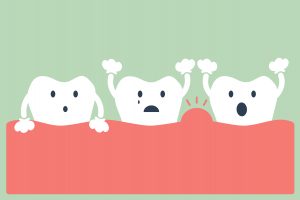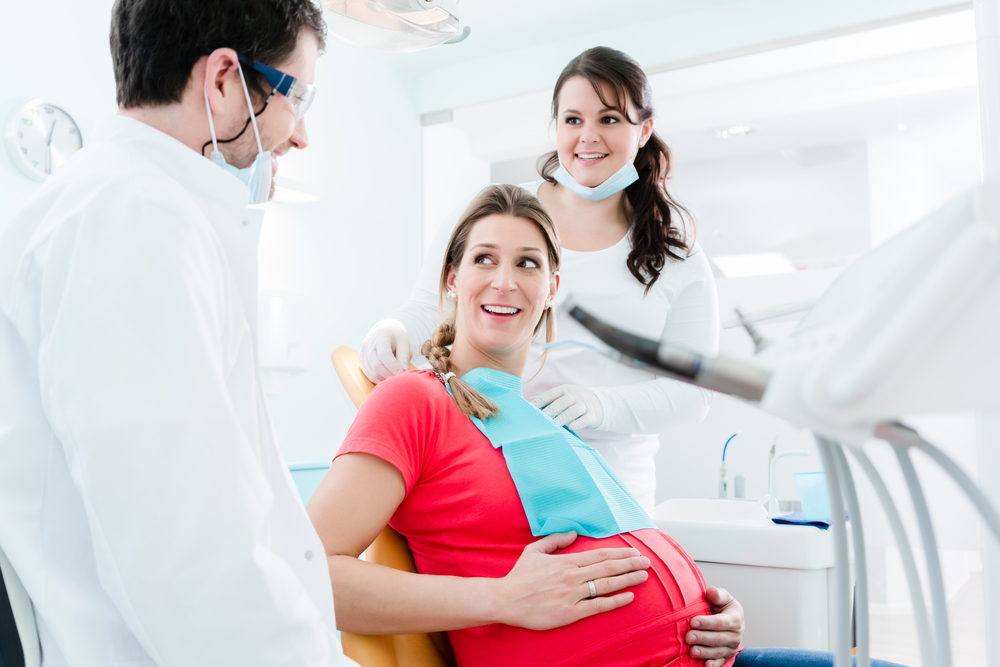Many women have been led to believe getting dental work while pregnant is dangerous to their unborn child. But that’s not the case. Dental work, even x-rays, are safe for you and your baby during pregnancy.
In fact, it’s to your baby’s benefit that you receive necessary dental care. The Children’s Dental Health Project has proven that if a mother has good oral health there’s a high likelihood her newborn will too.
If that wasn’t reason enough, there are other oral issues that can arise during pregnancy according to the American Dental Association. Your dentist can help you spot any of these before they become a problem, things like:
- Pregnancy gingivitis
- Higher risk of tooth decay
- Pregnancy tumors
Pregnancy Gingivitis
Pregnancy gingivitis is gingivitis that happens during pregnancy. It’s a swelling of your gums that makes them sensitive and prone to bleeding when being brushed or flossed. This happens because of the increased hormones in a woman’s body during her pregnancy. Your dentist will look for these symptoms and will help you treat them.
Higher Risk of Tooth Decay
There are a number of reasons pregnant women have more tooth decay than at other times in their lives. Often a pregnant woman’s teeth and gums are very sensitive because of the increased hormones, making it hard to brush and floss thoroughly.
Alternatively, if she is suffering from morning sickness the acid from vomiting can eat away at the protective layer around her teeth. And additional carbohydrates in a woman’s diet can also lead to increased tooth decay.
Again, your dentist will be able to talk with you about the symptoms to look for and how to treat any increased tooth decay resulting from your pregnancy.
Pregnancy tumors
During some pregnancies, women experience what dentists call “pregnancy tumors”. These are simply areas of overgrown tissue around the gums, usually occurring in the second trimester.
The word tumor makes it sound scarier than it is, these tumors are not cancer!
You’ll know you have a pregnancy tumor because there will be some swelling and redness and the area will bleed easily. Typically you’ll see them between your teeth. You can have them removed but they typically disappear after your baby is born. Again, talk to your dentist if you are worried in any way.

With those issues in mind, it’s also relevant to consider when to tell your dental office you are pregnant. The ADA recommends doing so as soon as possible. If you are seeing your dentist and think you may be pregnant let them know – even if you haven’t confirmed the pregnancy yet. They will take steps to ensure you are healthy and comfortable and your baby is too.
If you are already pregnant and are going in for a dental appointment, make sure your dental care provider knows how far along you are in your pregnancy. Let them know if you have a high-risk pregnancy or any other special needs. Also, you’ll want your dentist to contact your doctor in advance to discuss any treatments you may need.
When To Do Elective Dental Care During Your Pregnancy
If you do need elective dental treatment while pregnant, the Mayo Clinic recommends doing so in your second trimester, between week 14 and week 20. Why this particular window of time? Because your baby’s organs are developed and the chance of side effects is much lower.
Also, there’s been no evidence that dental work (like fillings, tooth removal or root canals) done during the second trimester increases the rate of birth issues. In other words, research shows elective dental work done during the second trimester doesn’t put your baby at any extra risk during birth.
If you aren’t sure if you need elective care, like if you have an infection or pain in your gums or teeth, be sure to see a dentist right away and discuss potential dental care you may need. Don’t let an infection get worse, your dentist can help you find medicine and treatments that will be safe for you and your unborn baby!
Anesthetics During Pregnancy
When you do need elective care during your pregnancy, it’s important to know anesthesia and x-rays are safe. The ADA did a study that showed using anesthetics while pregnant carries no significant risk to your pregnancy.
This study looked at the pregnancy outcomes of women who were given anesthetics during their pregnancy, and a group of women who did not (a control group). The moms who had dental care and local anesthetics showed no increased risk of major medical issues in their newborns. Some of those major medical issues the study considered included cerebral palsy, heart defects, miscarriages, premature births and abnormally low birth weight in babies. The results “… found no reason to associate dental treatment and local anesthetics with increased risk of negative outcomes.”
One of the doctors involved in the study went on to discuss why dental care is so vital for pregnant women. “It is a crucial period of time in a woman’s life and maintaining oral health is directly related to good overall health”, said Dr. Hagai. “Dentists and physicians should encourage pregnant women to maintain their oral health by continuing to receive routine dental care and seeking treatment when problems arise.”
So if you will be needing anesthesia for your dental care, you and your baby will be safe. There is no need to delay any procedures or avoid having dental work done. If you still feel unsure talk with your dental care provider about your concerns and work with him or her to find a solution.
X-Rays During Pregnancy
What is true for anesthetics is true for x-rays during pregnancy, according to the ADA. There is very little radiation from dental x-rays but your care provider will cover you and your baby with a leaded apron. That apron will cover your throat with a lead collar and your upper body, including your belly. The apron is specifically made to protect the human body (including a fetus) from the radiation in x-rays.

Again it’s perfectly safe to have x-rays done while you are pregnant, and it’s encouraged you do so when you have a check-up or any other dental care. If you’re nervous about the process, talk to your dental care provider to alleviate your concerns.
Oral Health During Pregnancy
If you’d like to minimize your chances of needing elective dental care while you’re pregnant, there are a few simple steps to follow. Preventative measures you can take to lessen the chances of needing anything aside from a routine checkup include:
- Regular exams
- Brushing twice a day
- Flossing every day
- Eating Healthy Foods
- Getting enough folic acid
- Avoiding sugars
- Staying rested
- Ceasing tobacco use of any kind
Dental Health For Mom Means Dental Health For Baby
We’ve already discussed why it’s important to get regular exams when you’re about to become a mom. As mentioned earlier, your dental health plays a significant role in the health of your baby’s mouth, teeth, and gums. If your dental health stays positive your baby has a much higher chance of the same.
Brushing your teeth is a critical part of ongoing dental health and care. While it may be difficult when pregnant, because of your morning sickness, extra sensitive gag reflexes, or just sheer exhaustion, brushing your teeth is a habit you should keep up with. Even if brushing causes you to gag, or makes your morning sickness worse, it’s important to brush regularly. Adding a mouthwash can also help keep your oral health at a high level.
Flossing is also a necessary component for maintaining oral health, and this doesn’t change when you are pregnant. Be sure to floss once a day, and let your dentist know if your teeth and gums are extra sensitive, as it could be a sign of pregnancy gingivitis.
Taking Care Of Your Health For You And Your Baby
Eating healthy is vital when you’re pregnant, so be sure to focus on getting plenty of vegetables and fruits in your diet along with whole grains, meat, fish, eggs, and beans. If morning sickness is a problem, try eating smaller meals throughout your day with an emphasis on healthy snacks like nuts, fruits, etc.
Part of eating healthy during your pregnancy includes getting enough folic acid. The National Maternal and Child Oral Health Resource Center recommends 600 mg of folic acid each day. You can find folic acid in green leafy veggies like spinach. It is also in asparagus, broccoli, beans, peas, lentils, strawberries, and bananas. If necessary, you can also take it as a supplement to ensure you’re getting the necessary amount you and your baby need every day.
One additional component of eating healthy is avoiding sugar. Stay away from candy, cakes, cookies, and other sweets as much as possible. Opt for water instead of juice or soda and drink it throughout the day to stay hydrated.
Furthermore, you should try to stay rested as much as possible during your pregnancy. The more rest you can give yourself and your baby, the lower your stress levels will be and the healthier you will be. In turn, that means your teeth, mouth, and gums will be healthier.
Finally, stop all use of drugs including tobacco of any kind whether it is smoking, vaping, or chewing while you are pregnant. Tobacco and the other ingredients in cigarettes are dangerous to you and your baby. Talk to your doctor about ways to quit any and all drugs as soon as you are pregnant.
These are some of the many ways to ensure you have a healthy pregnancy for you and your baby. Now that you know it’s safe to have dental work done during your pregnancy, be sure to make an appointment with your Houston dentist today.

